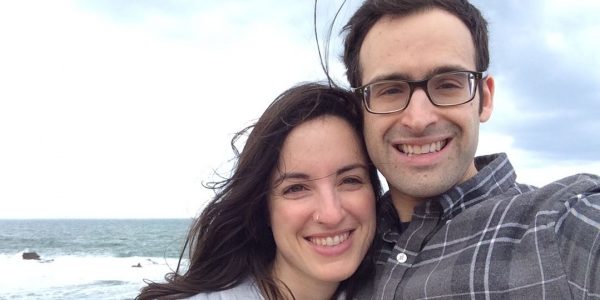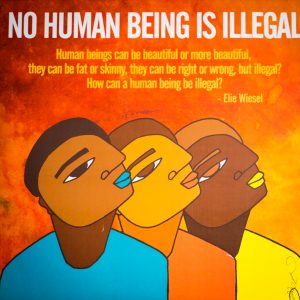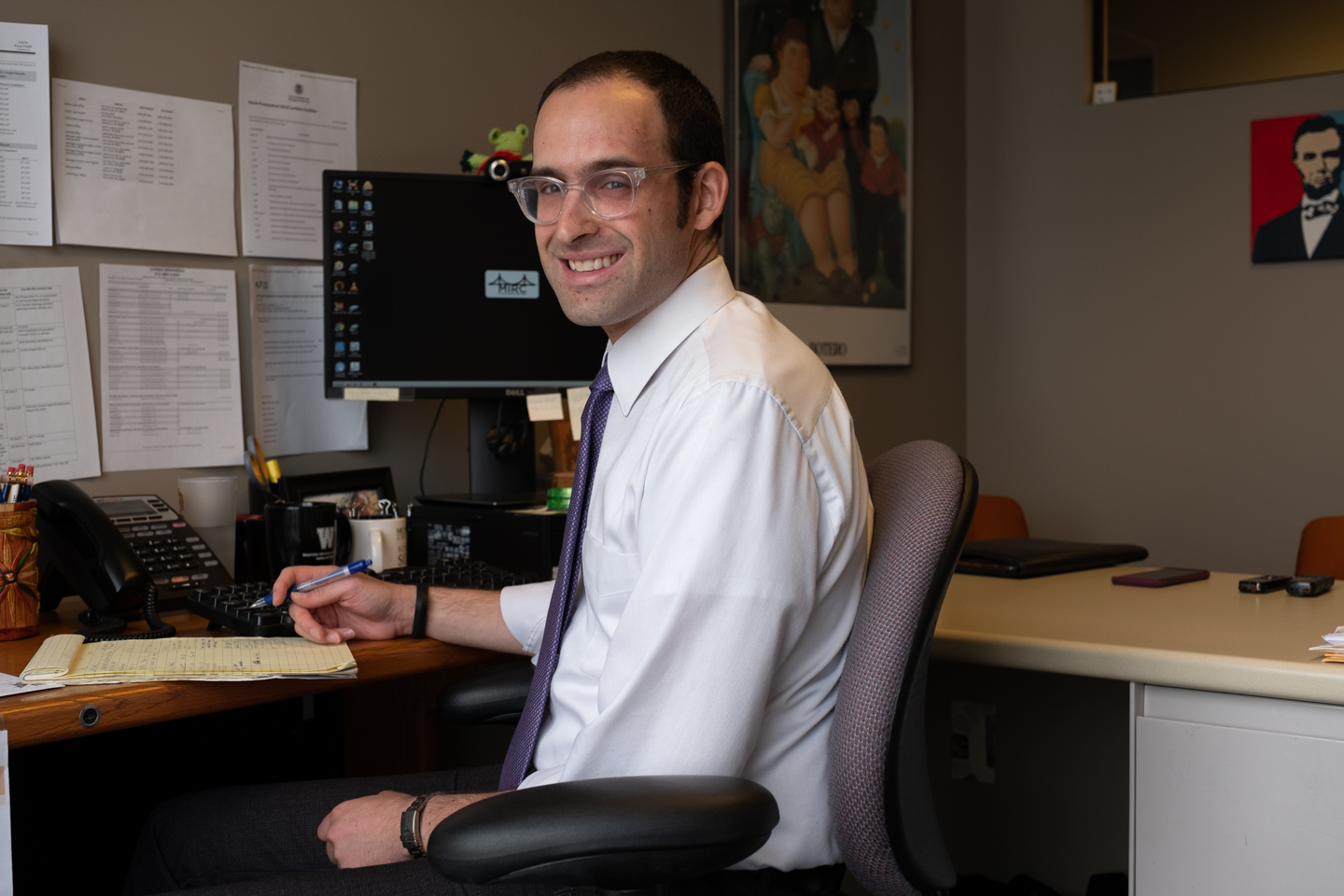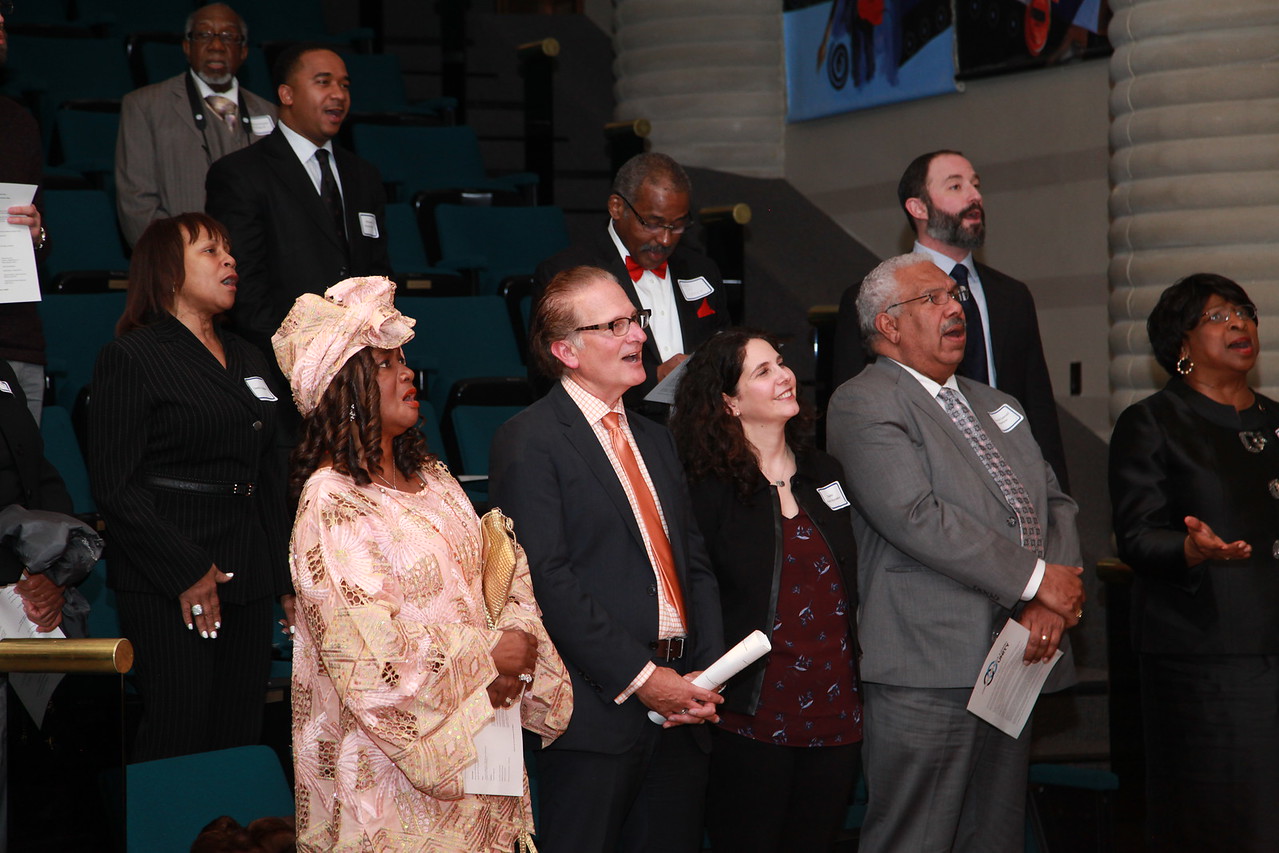by Vivian Henoch
“Our laws are complicated,” says Ruby. “Our ‘modern’ immigration system goes back to 1965, and the numbers of Green Cards in many categories have not changed since then. If you are undocumented, there is no ‘line’ you can get in, no application you can just fill out to fix your immigration status. And, if citizenship were as simple as marrying a U.S. citizen, I’d be out of a job.
What I want people to know – and to be attuned to hearing – is that language matters when talking about immigrants. The immigration law text itself refers to non-citizens as aliens, but we prefer not to describe any person as an “alien.” The words “illegal alien” or “illegals” are jarring, degrading and (grammatically) wrong. In fact, “illegal alien” is used only once in the Immigration and Nationality Act. Immigrants can be undocumented, they can be asylum-seekers; their names can be Mohamed, Jose or Frank. But to quote Elie Wiesel, “No human being is illegal.”
“No human being is illegal. Human beings can be beautiful or more beautiful, they can be fat or skinny, they can be right or wrong, but illegal? How can a human being be illegal?” – Elie Wiesel
It is no surprise that Ruby Robinson is a former marathon runner. Wired for endurance, persistence and patience over the long distance, Ruby has found his calling with MIRC – as an attorney with the temperament of a rabbi. “I’d say I’m a social worker/ educator/ counselor 80% of my time. When people ask me what I do, I tell them I manage expectations.”
A resident of Hubbard Farms in Southwest Detroit, listed this year in the Detroit Jewish News Class of 36 under 36, Ruby is an active volunteer in the community at large. He is a board member of the Jewish Community Relations Council/AJC and co-chair of its government relations/ domestic affairs subcommittee. Involved in the leadership of both the Isaac Agree Downtown Synagogue and uptown at B’nai Israel Synagogue of West Bloomfield, Ruby can be found assisting with services as a gabbai on any given Shabbat. As though those activities were not enough, Ruby has served as co-chair of the Limmud Michigan programming committee and was selected last year to be a part of the prestigious Wexner Program, a two-year commitment to leadership development in the Jewish community.
Planning their wedding this summer, Ruby and Yifat Clein (a social worker in mental health on staff at Kadima) will marry in September. With family now in Kibbutz Sasa and Tel Aviv, visits to Israel are destined to be frequent.

In conversation with Ruby Robinson, activist, advocate, attorney
myJewishDetroit: In five words, what qualities would you say you need to be an effective advocate for your clients?
Ruby: Kindness. Compassion. Reliability. Thoughtfulness. Determination.
myJDet: As you wish, please share a little about your educational background. How did you become an immigration attorney?
I grew up in Franklin, went to Groves High School and graduated from U of M with a degree in English and History – the kind of education you can do everything and nothing with. So, prior to law school, I spent some time as an AmeriCorps*VISTA (Volunteer in Service to America) in a social service agency in Brooklyn, NY, doing frontline work with emigrés from the former Soviet Union, Holocaust survivors and others facing challenges in the community.
Living in New York was fun, a great place to be in my 20’s. I call it “my New York interlude.” But I knew I wanted to go back to school and saw how a law degree ultimately would open doors for me and make me a better advocate for people in need.
It was the heart of the recession – a good time to be a law student and a better time to come home. Though I applied and got into several laws schools, my Midwestern sensibilities kicked in and brought me back to Detroit to Wayne State University Law School.
From the start of law school, I knew I wanted to be involved in advocacy or public interest in some way. That first summer, I got a job as a volunteer working the hotline at an organization called the Counsel in Advocacy Law Line – “CALL.” At that time, CALL was the statewide intake center for almost all the legal aid organizations in the state of Michigan. So, say you were evicted or wanted to file for divorce, you’d call us. The phones were answered by attorneys and we’d provide brief legal advice and assistance over the phone. It was like a legal services emergency room – a triage system. For more serious cases, such as domestic violence where children were involved, we referred cases to our local aid offices around the state for direct representation.
The CALL experience was eye-opening. Essentially, every call I answered on the job was a rehearsal for a question on the Bar Exam. I learned a lot on the job and stayed for the duration of law school, then continued to work there for a year, answering calls from people facing foreclosures, evictions, bankruptcy, utility shut-offs, divorces – the whole parade of horribles stemming from the financial woes of the recession. It’s my opinion that every attorney should work in legal aid at the start of their career in the law because it grounds you and then teaches you how the law works and how it is practiced every day.
myJDet: What drew you to immigration law?
Because it sounded interesting, I took an asylum and immigration clinic for a semester at Wayne State. And that was another eye-opening experience helping two sets of clients from Rwanda seek and ultimately obtain asylum in the United States. In the legal service realm, many immigrants – non-citizens – are ineligible for the legal services we take for granted in other contexts.
Every person charged with a crime in the United States has a Sixth Amendment Right to counsel, even if they can’t afford an attorney. But in a civil proceeding – such as divorce, bankruptcy, eviction, foreclosure —those sorts of civil matters — the government is not required to provide an attorney. Immigration law is civil law so when someone is sent to removal proceedings, the government is not required to provide counsel there either. Your situation can be a matter of life or death, but in the context of civil law, you are often invisible in our system unless you can afford counsel. Whether you are three years old or 30 years old, whether you are a frail senior or even incompetent, the government is not required to pay for your attorney. So, if you have counsel, if you have an advocate and representation in court, it can make all the difference in the outcome of your case and your access to justice.
myJDet: Please explain the difference between a refugee and a person seeking asylum.
Refugees and asylees must meet the same basic definition: that they have a well-founded fear of persecution by the government on account of their race, religion, origin, membership in a particular group, or political opinion or that the government is unable or unwilling to protect them. The difference is where that decision is made.
A refugee is someone outside the United States who has gone through the U.N. High Commission on Refugees and has met the requirements and background checks of many departments and agencies, including the State Department and the U.S Citizenship and Immigration Service (USCIS). What most people don’t appreciate is that it takes 19 steps to travel and enter our country as a refugee.
An asylee is a person who is approved through a similar process, inside the U.S., either affirmatively with USCIS or in a defensive posture in Immigration Court.
The challenge now with the administration’s “zero-tolerance policy” is that it has sowed confusion, anger and fear not only in the border region, but across the country. We’re seeing a sharp rise in people without criminal records being detained in all settings — families separated at the borders, people in their homes, people out on the streets, people who are driving. It’s creating a lot of havoc. People are worried, scared to leave their home, take their kids to school, given this substantial rise in the number of detentions.

myJDet: How accurate are the claims that our immigration laws are broken?
There haven’t been any substantial changes in the immigration system since 1997. But the power that the executive branch wields is incredible. And we’re seeing that in full force right now.
Even so, our immigration system is not broken. While it can certainly be improved, the system does what it is designed to do which is to preserve certain underlying racist immigration policies. As a nation, we have a shameful immigration history that excluded the Chinese altogether, drastically reduced immigration from Eastern and Southern Europeans in the early 20th century, interned Japanese Americans, and until the early 1950s, prevented anyone who was not considered a “free white person” or “aliens of African nativity. . . or descent” from naturalizing.
More recently, the 1997 immigration law changes altered the landscape to penalize—criminally and civilly—people who had (or were) entering the United States unlawfully or overstaying their visas. It created additional legal barriers to permanent residency (Green Cards), limited waivers, and reduced the relief options in removal proceedings in a perverse way. As a result, brown people have overwhelmingly endured the harsh consequences of these changes.
Could our laws be better? Absolutely. They might be outdated, backward, and punitive, but the laws that govern our immigration system are not broken because they accomplish their implicit goal which is to perpetuate underlying, institutional/structural racism that favors white immigration over brown immigration.
myJDet: Please give us a snapshot of MIRC and your role as Managing Attorney.
MIRC is a resource for Michigan’s immigrants and immigration applicants. We function as a central hub for immigration matters throughout the state with offices in Ann Arbor, Kalamazoo and Grand Rapids. Additionally, we operate a satellite office in Detroit that focuses on community-based work.
Similar to the triage work provided by legal aid, we provide advice and services primarily addressing the needs of low-income immigrants; we also provide free direct representation to certain populations who would have difficulty getting assistance elsewhere, such as survivors of domestic violence or victims of crime and farmworkers; and we represent almost all unaccompanied children in federal custody who are here in Michigan.
Every day represents a different challenge. There’s never a dull moment in what comes to us in referrals from shelters, requests to extend immigration status, applications for Green Cards and citizenship, requests for asylum, assistance to get out of immigration detention on bond, and other types of relief. Our job is to provide hope and assurance that families can be here together so that Michigan continues to thrive. We need everybody in Michigan, people born abroad and people who were born here.
Though much of our case load consists of immigration work, we also serve Michigan’s large farmworker and migrant worker population with an outreach program, working in camps to ensure that farmworkers are paid fairly, accurately and without discrimination. We also do impact litigation against private and public actors when appropriate, often in collaboration with other nonprofits and civil rights groups. We provide training, technical support and assistance to other attorneys working on immigration cases and mentor and support a large pro bono program as well.. In short, I consider myself an expert juggler – hand-holder, coalition-builder and advocate for an enormously underserved immigrant population.
As a non-profit, MIRC provides services free of charge. That means we perpetually search for funding through grants from large foundations, private companies and individuals. Recently, we are fortunate to have received a grant from the Kresge Foundation and the Community Foundation for Southeast Michigan.
myJDet: It sounds like you spend much of your time helping people work out difficult situations. How do you manage stress and stay healthy?
I do this work because I care. During my seven years in legal services, I have been able to help thousands of people with small and large legal problems. At the same time, I have been unable to help a lot of people too because of limited resources, time, complexity of cases, or in many situations, lack of legal solutions. As such, I have learned to say “no.” It has not been easy to do so and I am the first to admit that I say “yes” too often, but saying “no” has been one way that I attempt to limit the cases and tasks on my plate.
I also recognize the physical and psychological effects of persistent stress and secondary trauma. Every day, our clients tell us stories about their lives that are horrific and trauma-filled. It is our job, first of all, to listen and to understand their circumstances. Then, it is our role to determine how/if we can utilize these real life stories to help our client achieve their goal(s), using the law as a vehicle. Unfortunately, we cannot forget many of these stories and end up taking them home with us. Therefore, it is imperative that I practice self-care. One way of doing so is running. I strive to run at least three days per week, even when a week is really stressful.
Another way that I practice self-care is to physically separate work from home. I actually enjoy my commute between Detroit and Ann Arbor because it gives me time to decompress and debrief before I get home. Also, I am less likely to return to work on the weekend if it is forty minutes away, so boundaries really do matter. And when I am home, I do try to limit work-related activities and emailing.
On community work and synagogue life
myJDet: How do you set boundaries in your busy career?
One way I do this is my community involvement. I am a board member of the Jewish Community Relations Council/ /AJC, where I serve on the Government Relations Committee. I continue to participate in a Jewish “festival of learning” with Limmud Michigan, part of a global forum for Jewish education. And every Shabbat, nearly without fail, you’ll find me at synagogue.
Judaism always has been a big part of my life, a commitment reinforced growing up with strong examples of activism and volunteerism in my family. Synagogue is one of the places where I get a strong sense of community. Because I am part of a community in Detroit and also have a strong connection with the Jewish community in West Bloomfield, I am affiliated with two synagogues.
No matter what’s going on at the office every Friday, I see to it that I leave work at 5 or 6 pm. And that’s it, I’m done. I also strive to keep Shabbat as my day. To the greatest extent possible, I don’t check email, I don’t work unless an emergency arises like the travel ban that went into effect last January and I had to be at the bridge and tunnel, and then helping to quarterback a local response.
myJDet: As a member of the Wexner Heritage Program, Class of 2017-18, what have been your greatest lessons so far?
I have been humbled to a part of the Wexner program, now finishing the first of a two-year curriculum. It’s been a remarkable opportunity to delve into Jewish history, thought and text in depth and to focus on personal growth and leadership development using Judaism as a lens.
Greatest lessons so far? Everything I’ve learned from my cohorts – twenty busy professionals, reaching for the heights in their community roles, each with a vision for the future of Jewish Detroit and how we can help achieve more together. Our teachers are also fantastic and have provided us a strong foundation from which we can grow as Jewish leaders.
Favorites
Restaurants: Pie-Sci Pizza in Woodbridge, Cass Café in Midtown, The Lunch Room in Ann Arbor
Places to hang out in Detroit: The RiverWalk, seeing and interacting with people from all walks of life together any day; Clark Park
Places to take visitors: Motown Museum, Dabls MBAD African Bead Museum, Shatila in Dearborn; and a driving tour of Detroit neighborhoods for contrasts and surprises from architectural splendor to urban prairie
Vacation places: Who goes on vacation?
Sports and leisure: Running, hiking, canoeing, reading, traveling, exploring Detroit and taking a Shabbat nap.
Jewish Food: Babka from Stage Deli; smoked fish
Guilty pleasures: Dutch Girl donuts
Never leave home without: My watch and, since January 2017, my laptop.
Reading now
White Trash: The 400-Year Untold History of Class in America, by Nancy Isenberg; The Glass Castle, A Memoir, by Jeannette Walls; Hillbilly Elegy: A Memoir of a Family and Culture in Crisis, by J.D. Vance
Words to live by
From Pirkei Avot (Ethics of Our Fathers), “It is not incumbent upon you to finish the task, but neither are you free to desist from it.”
And, as my dad always says: “Don’t forget who you are or where you come from.” And “If it doesn’t look right, it’s probably not.”




